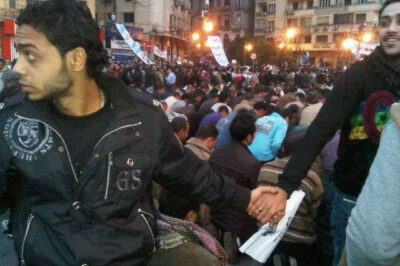A prayerful minister says her country is passing through
a “spiritual birth canal”
My Egyptian friend Nadia*, who was raised in a Christian
family in Cairo, has been glued to Twitter, television and various blogs since
violent demonstrations erupted in her country two weeks ago. But she is also
praying—and asking the Christian community in the United States to join her.
“For
the church in Egypt, it feels like we are going through a spiritual birth
canal,” Nadia told me in an interview this week.
That
birthing process is precarious. The uprising that began on Jan. 25 is a
response to years of political and economic oppression. Yet at the same time
Islamic fundamentalists are angling for control—and they could turn Egypt into
a radical Muslim state like Iran.
“If
there is a power vacuum, the Islamists could take a foothold and eventually
take over the country,” Nadia says.
“Thus the Lord will make Himself known to
Egypt, and the Egyptians will know the Lord in that day. They will even worship
with sacrifice and offering, and will make a vow to the Lord and perform it.
The Lord will strike Egypt, striking but healing; so they will return to the
Lord, and He will respond to them and will heal them.” —Isaiah 19:21-22
The
Christian community in Egypt is divided over how to respond to the current
crisis. Some are simply hoping for a return to calm. Others welcome the change.
Some even say the church may have to go through a season of difficulty—perhaps
even a wave of persecution—in order to see the spiritual revival they know God
wants to bring to their nation.
“I
never would have thought two weeks ago that my country would be turned upside
down like this,” Nadia says. “But I am praying, ‘Lord, use this to establish
Your sovereign will.’”
Islamic
fundamentalism has been on the rise in Egypt for decades. Christians often are
denied jobs and promotions. Outside of churches, public assembly of Christians
is rarely allowed. All ministry directed toward Muslims is illegal, and Muslim
converts to Christianity are not allowed to change their religion on their
national ID cards.
Yet
last weekend, during the street demonstrations in Cairo’s Tahrir Square, a hint
of religious freedom was in the air. On Feb. 6, a large group of Christians
from various churches sang and chanted “Bless my nation!” while an Egyptian
preacher told the crowd that Jesus Christ—Issa the son of Mary, as he is known
to Muslims—defends justice and cares for the poor.

few days earlier, in the same square, a group of Christians encircled some
Muslims who were praying, locked arms and formed a human shield to show the
world that Christians would defend their Muslim friends as they assembled to
worship. More than 320,000 people have viewed that scene since a participant in
the demonstration posted a photo of it on Twitter. (pictured.)
Nadia says most Egyptians—including a majority of
Muslims—were horrified on New Year’s Eve when Islamists blew up a church in
Alexandria, killing 25 people. “It shook the nation,” Nadia says. “People could
not believe this was happening. It laid the ground for some unity.”
Nadia, who is involved in ministry in Egypt,
remembers walking around her city when she was a young adult. Back then, it was
rare to see a woman wearing the Islamic veil. But today, she reports that as
many as 85 percent of women are covered in hijabs (veils covering all
but a woman’s face and hands) while some don the more conservative niqabs
(full black tents that only allow a woman’s eyes to be seen).
The heavy fabric is a visible manifestation of the
shift toward Islamic fundamentalism that has occurred in Egypt since the 1980s.
It also symbolizes the retreat of women to more traditional and less visible
roles. However, the uprising of Jan. 25 has brought many women out to the
streets to call for freedom.
Regardless of what happens in the next few months,
Nadia is holding tightly to a prophecy from Isaiah that many Egyptian
Christians have memorized.
Isaiah 19:21-22 says: “Thus the Lord will make
Himself known to Egypt, and the Egyptians will know the Lord in that day. They
will even worship with sacrifice and offering, and will make a vow to the Lord
and perform it. The Lord will strike Egypt, striking but healing; so they will
return to the Lord, and He will respond to them and will heal them. (NASB)”
“I know we will see the glory of the Lord
cover Egypt,” Nadia says confidently. “An altar for the Lord will be
established in our land.”
* Nadia’s name was changed to protect her and her family.
J. Lee Grady is the contributing editor of Charisma. You can find him on Twitter at leegrady.
Watch scenes
from a peaceful Christian demonstration in the streets of Cairo. Those chanting in unison are saying in Arabic: “Bless my nation,” and “Bread!
Freedom! Human Dignity!”
{youtube}4Af5E6fTdlw{/youtube}
J. Lee Grady is an author, award-winning journalist and ordained minister. He served as a news writer and magazine editor for many years before launching into full-time ministry.
Lee is the author of six books, including 10 Lies the Church Tells Women, 10 Lies Men Believe and Fearless Daughters of the Bible. His years at Charisma magazine also gave him a unique perspective of the Spirit-filled church and led him to write The Holy Spirit Is Not for Sale and Set My Heart on Fire, which is a Bible study on the work of the Holy Spirit.








Leave a Comment
You must be logged in to post a comment.